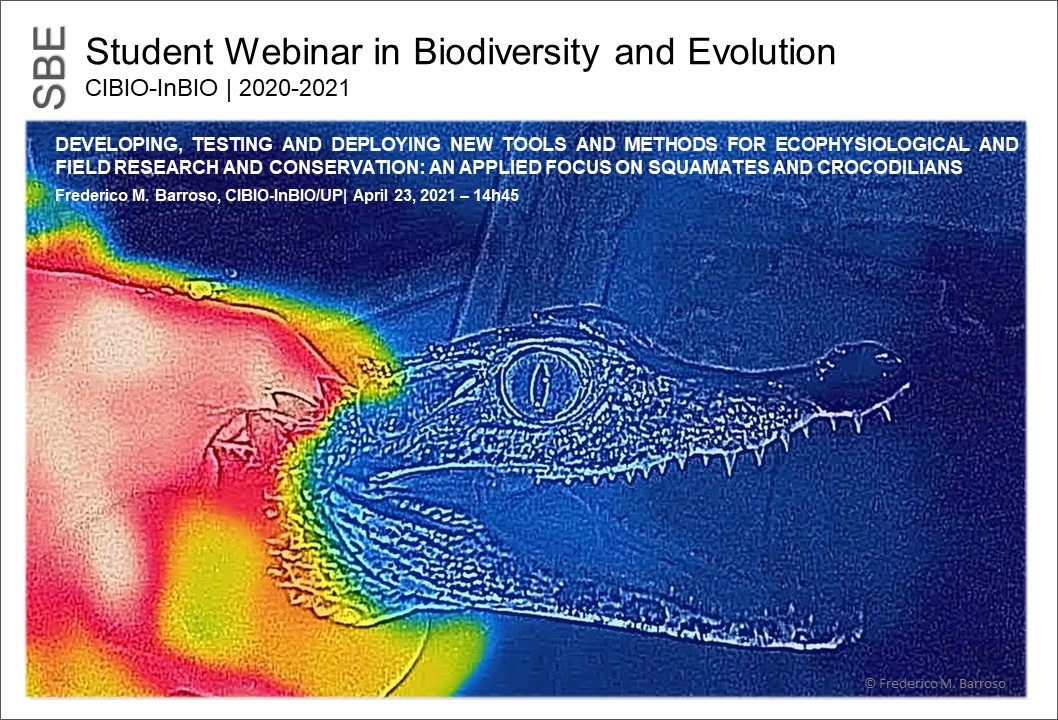Developing, testing and deploying new tools and methods for ecophysiological and field research and conservation: An applied focus on squamates and crocodilians
23 Apr 2021 - Frederico M. Barroso, CIBIO-InBIO/UP | 14h45

STUDENT WEBINAR IN BIODIVERSITY AND EVOLUTION
In this seminar I will present how I have adapted the focus of my initial thesis plan in order to be able to cope with the restrictions and uncertainties posed by a mid-pandemic world. Given the restrictive and uncertain times we have all experienced in the past year, which, for many of us, resulted in the impossibility to perform much (or all!) of our planned fieldwork (especially abroad), I eventually reached the inevitable conclusion that my initial thesis plan would no longer be feasible (given the situation in particular at the study sites in Peru and Brazil). Hence, what was once a project focused on describing the ecology of Paleosuchus spp. (a genus of neotropical crocodilian) with a particular applied interest in its conservation, has now changed its aim towards a more general, methodological approach at developing, testing and deploying novel tools and methods for the study and conservation of such animals (as well as of other reptiles). Such tools and methods will heavily rely on emerging technologies such as InfraRed thermography and custom, integrated tags. Nonetheless, since the ecophysiological data of Paleosuchus spp., intended for my initial project, is no longer the sole focus of the thesis, I am now able to be more flexible in terms of species and hence location and scheduling, thus allowing me to work with other species of crocodilians and even lizards and snakes from anywhere in the world, while waiting for the opportunity to visit the initially planned locations. With this in mind, I have now designed an adapted project which focuses on developing and testing the tools and methods that will, in the future (near or far), allow me to collect the data on Paleosuchus spp. as initially intended.
In this seminar I will present how I have adapted the focus of my initial thesis plan in order to be able to cope with the restrictions and uncertainties posed by a mid-pandemic world. Given the restrictive and uncertain times we have all experienced in the past year, which, for many of us, resulted in the impossibility to perform much (or all!) of our planned fieldwork (especially abroad), I eventually reached the inevitable conclusion that my initial thesis plan would no longer be feasible (given the situation in particular at the study sites in Peru and Brazil). Hence, what was once a project focused on describing the ecology of Paleosuchus spp. (a genus of neotropical crocodilian) with a particular applied interest in its conservation, has now changed its aim towards a more general, methodological approach at developing, testing and deploying novel tools and methods for the study and conservation of such animals (as well as of other reptiles). Such tools and methods will heavily rely on emerging technologies such as InfraRed thermography and custom, integrated tags. Nonetheless, since the ecophysiological data of Paleosuchus spp., intended for my initial project, is no longer the sole focus of the thesis, I am now able to be more flexible in terms of species and hence location and scheduling, thus allowing me to work with other species of crocodilians and even lizards and snakes from anywhere in the world, while waiting for the opportunity to visit the initially planned locations. With this in mind, I have now designed an adapted project which focuses on developing and testing the tools and methods that will, in the future (near or far), allow me to collect the data on Paleosuchus spp. as initially intended.
Frederico Barroso got his Integrated Masters (MSci) degree in Zoology from the University of Glasgow in 2017. During his university career, Frederico produced his Bachelor thesis on the nighttime thermal ecology of 3 sympatric species of neotropical crocodilians as well as a Master’s thesis on the use of thermography to internal body temperature of lizards (a work developed during a 1-year internship at CIBIO). Since graduating, Frederico has worked as a field herpetologist and science outreach staff member for Operation Wallacea (an international conservation organisation) having worked on several expeditions ranging from Croatia, though Honduras to Peru. Over such years, Frederico combined his fieldwork experience with his Bachelor and Masters thesis outputs to develop his [initial] PhD plan. He is now a 2nd year BIODIV student undertaking his PhD project under the supervision of Miguel A. Carretero (FBIO, CIBIO), Marco Sannolo (CSIC, Madrid) and Prof. Ronis da Silveira (Univ. Federal do Amazonas, Brazil), while under the financial support of an FCT doctoral grant and logistics (field) support of Operation Wallacea (UK) and FundAmazonia (Peru).
[Host: Miguel A. Carretero, Functional Biodiversity - FBIO]